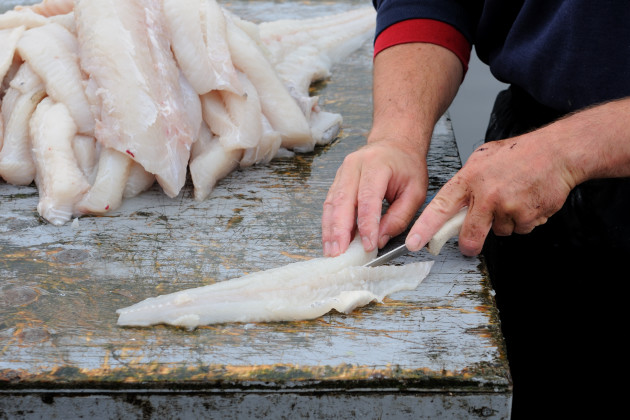
Newfoundland cod stock shows signs of recovery
Food in Canada
Food In Canada Sustainability Seafood fish Newfoundland sustainability WWF CanadaAn independent assessment shows that Newfoundland’s northern cod stock has grown since 2006, as goals are set for even further improvement
 Filleting Cod
Filleting Cod The Newfoundland northern cod stock has grown significantly since 2006, according to an independent assessment completed by SAI Global on behalf of WWF-Canada and the Fish, Food and Allied Workers Union (FFAW-Unifor). The assessment cautions, however, that numbers are far below what they were during the peak commercial success of the fishery.
FFAW-Unifor, the Seafood Producers of Newfoundland and Labrador, Fogo Island Co-op and WWF-Canada agreed to work together to rebuild the fishery off Newfoundland’s northeast coast, also referred to as area 2J3KL, through a Fisheries Improvement Project (FIP) in 2015.
“WWF-Canada is pleased to see that northern cod is showing quite spectacular signs of recovery. There is a lot of work that needs to be done, but with the stock health improvements we’ve seen so far, we are confident that the comprehensive Fisheries Improvement Project we’re undertaking along with FFAW-Unifor and other partners will help build on these positive trends,” says David Miller, president and CEO of WWF-Canada.
According to a media release, this multi-year collaborative project is designed to improve the fishery so that it may one day reach the sustainability benchmark set by the Marine Stewardship Council (MSC). The project also has the support of the Newfoundland and Labrador Department of Fisheries and Aquaculture, as well as Oceans and Fisheries Canada.
Comparing the fishery’s performance against 28 indicators of the MSC Fisheries Standard, the assessment identified several issues, and a FIP Action Plan is expected to be developed to address the following:
- The rebuilding timeframe for the stock must be established.
- Target reference points must be determined.
- Explicit harvest control rules must be established.
- Estimates will be required for the recreational cod catch.
“The increase in productivity of this stock in recent years suggests that it’s not too early to start thinking about how a future fishery should be pursued. A viable, sustainable fishery contributes to vibrant rural communities in Newfoundland and Labrador. We need to put measures in place now to enable the stock to further grow and plan for the future of the fishery. In partnership with WWF-Canada, this Fisheries Improvement Project can help us achieve these goals,” says Keith Sullivan, president of the Fish, Food and Allied Workers Union of Newfoundland and Labrador.
Print this page